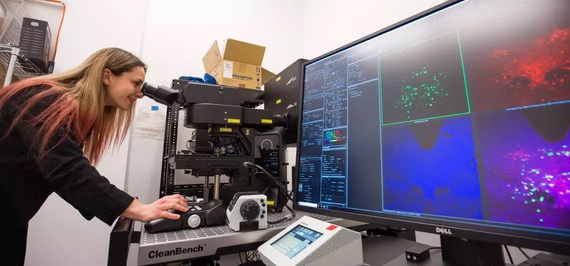Author: Betty Rice, for the Faculty of Arts

Derya Sargin has been awarded a Canadian Foundation for Innovation John R. Evans Leaders Fund grant. Photo by Riley Brandt, University of Calgary
Anyone who has spent time with a child or young adult gets to know their individual character and what makes them unique. Regular interaction will reveal the emerging personality of each child, quirks and all.
When children face prolonged, chronic, or intensely stressful situations, they begin to show signs of more extreme behavioural changes in their personalities. Often referred to as toxic or traumatic stress, it most definitely provokes concern for the child's health and well-being.
"The types of stress that can result in long-term health concerns would be those that expose the kids to physical, sexual, emotional abuse, violence, or neglect," explains Dr. Derya Sargin, PhD. "And it's especially the case if the stressors are ongoing."

Derya Sargin in the lab. Photo by Riley Brandt, University of Calgary
Sargin, an assistant professor in the Department of Psychology in the Faculty of Arts, has been awarded a Canadian Foundation for Innovation John R. Evans Leaders Fund (CFI JELF) grant to fund her research team's study of the neurological effects of chronic stress on young brains.
Sargin explains the human brain develops until a person reaches their mid-20s. Until then, child and adolescent brains have quite a bit of flexibility during a critical development window. This makes the brain more easily affected in the presence of adverse experiences such as persistent stress.
"There is scientific evidence that chronic stress during early life can change the architecture of the brain," says Sargin. "This can cause disruptions in brain connectivity, and these changes can be risk factors for the outcome of long-term emotional and social difficulties, and for neuropsychiatric diseases such as mood disorders.
We don't fully understand how the brain is affected in response to early life adversities. But there is a major effort in the scientific community to address these questions and understand the developmental changes in the brain and how these can be prevented.
Sargin's research focuses on understanding how brain connectivity changes in response to early life stress. The CFI JELF grant will provide tools that enable researchers to examine and image deep brain regions, allowing for the observation of changes to brain activity that take place simultaneously in different brain areas.
"The availability of recent state-of-the-art techniques allows us to be able to look into the activity of specific cell types in the brain and to observe how the activity of these cells and those they connect with are changed in response to stress," explains Sargin.
By understanding how chronic stress impacts the brain, the researchers' goal is to inform treatment for chronic stress in children and youth.
"We hope that our research will help improve drug therapy and treatment through brain stimulation. If we can understand more about how chronic stress affects brain and behaviour and understand more about the link between chronic stress and mental health, we hope to inform others about intervention strategies."
Sargin says that beyond the goal of better understanding the effects of chronic stress and neural activity and to discover targets for intervention and treatment strategies, the CFI-JELF will allow her team to establish the latest innovative infrastructure in the lab to address their research questions and allow them to strengthen existing collaborations and foster new ones.
Derya Sargin is an assistant professor of psychology in the Faculty of Arts and a research assistant professor in the Department of Physiology & Pharmacology at the Cumming School of Medicine (CSM). She is also a member of the Alberta Children's Hospital Research Institute, Hotchkiss Brain Institute (HBI) and The Mathison Centre for Mental Health Research & Education at the HBI.













